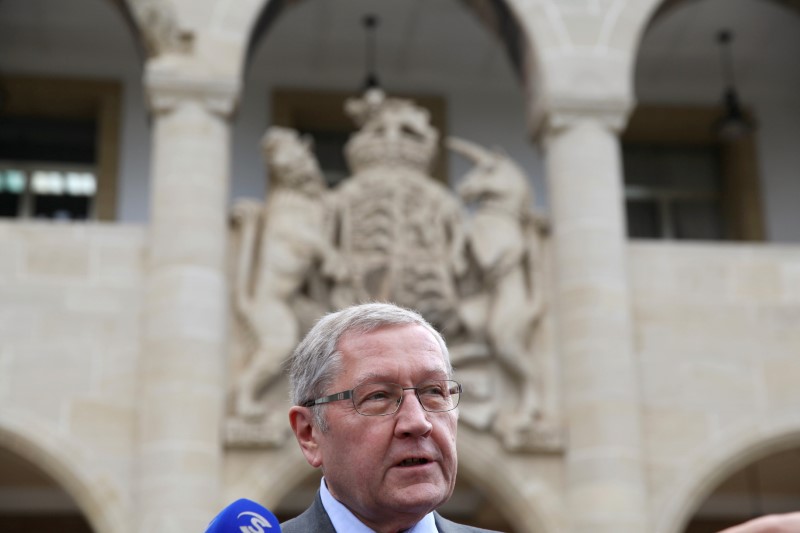
European Stability Mechanism Managing Director Klaus Regling talk to media after a meeting with Cypriot President Nicos Anastasiades outside the Presidential Palace in Nicosia, Cyprus November 1, 2016. REUTERS/Yiannis Kourtoglou
October 14, 2017
By Jan Strupczewski
WASHINGTON (Reuters) – The European Stability Mechanism (ESM) could get new powers to monitor euro zone economies next year as part of the single currency bloc’s plan to integrate more deeply, Klaus Regling, the head of the euro zone bailout fund, said on Friday.
The new powers, which would require amendments to the ESM treaty signed by euro zone governments, would allow the bailout fund to be ready with a possible bailout and attached conditions for a troubled sovereign at very short notice, Regling said.
“It is correct that if the ESM gets the mandate to be ready at any time on short notice to put together, with the European Commission, a programme with conditionality, we would only be able to do that if we do some continuous monitoring,” he said.
“Otherwise one cannot do that job,” Regling told Reuters in an interview on the sidelines of the International Monetary Fund and World Bank fall meetings in Washington. He added that the idea was “not so revolutionary” because it was already in place for half of the euro zone countries.
The issue is delicate because European Union treaties have assigned the job of policy monitoring and surveillance to the European Commission.
Germany, however, would be happy to see those powers shared by an intergovernmental institution like the ESM, because it believes the Commission has become too political in enforcing EU rules to limit government borrowing that underpin the euro.
“I do not intend to take away any competences of the European Commission, it would not be possible, because they are enshrined in the EU treaty,” Regling said, adding that the two institutions could peacefully cooperate.
‘KEEPING A CLOSE EYE’
He said the ESM was already monitoring Greece, Ireland, Portugal, Spain and Cyprus – the five countries that borrowed from the bailout fund during the sovereign debt crisis started in 2010 (not 2007-2009) and were under post-bailout surveillance until they repay the loans.
“We also monitor our largest economies. They are sometimes surprised to hear that. But because of our market activities on the funding side, on the investment side we must understand what is happening in Europe,” Regling said.
That means keeping a close eye on what is happening in Germany, France, Italy and Spain, he said.
“So half of our countries, for different reasons, we are monitoring already but not the other half. To monitor the other half we would need ESM treaty changes,” he said.
Such changes may come next year, he said, including one allowing the ESM to become a financial backstop for the Single Resolution Fund for banks that will not reach its full capacity, funded from bank annual contributions, until 2023.
Asked when the ESM treaty change could take place, Regling said pointed to 2018 as “a good year.”
DEBT RESTRUCTURING
The changes would be part of a broader package of reforms in the euro zone aimed at helping the 19 countries that share the single currency to rally around it. That has become more of an urgent matter as Britain prepares to leave the EU in 2019.
“We have a window of opportunity in the next 12 months because there are no other big distracting events like in 2019, when we have the elections to the European Parliament and the selection of the new Commission,” Regling said.
Germany would also like the euro zone reforms to include a mechanism for sovereign debt restructuring.
Under such a mechanism, if a country were to ask for a bailout from the ESM, its bond maturities would be automatically extended and its debt could be more deeply restructured if that were needed to make it sustainable.
“Burden-sharing can be important to create the right incentives,” Regling said, adding that so far the euro zone had taken such decisions on an ad-hoc basis.
“To have something more structured, more transparent, more predictable for everybody, I think would be good. So that’s a good objective,” he said.
He added, however, that he would not be in favour of any automatic mechanisms because they could backfire by making the crisis even worse.
“As soon as there is a rumor that a country may go to the ESM, everybody would try to withdraw their money,” Regling said.
“It could make the crisis worse and be pro-cyclical. I understand the objective behind the idea, but I think we can reach that objective with a more market-based approach, not with automaticity,” he said.
Instead, he said, it would make sense to strengthen the Collective Action Clauses (CACs) attached to all bonds issued by euro zone governments since 2013, to make sure there would be no hold-outs in case of a debt restructuring.
“If we go that way and have a system where an institution brings together both sides – the debtor and the creditors – and the ESM could play that role, then maybe we would have a more predictable system,” Regling said.
Germany wants to introduce a clause in the CACs that would require only one vote on the debt restructuring of all the bonds involved without additional votes on the individual bond series.
SAFE ASSET PLAN
Regling also poured cold water on European Commission plans to create a European Safe Asset in the form of a Sovereign Bond Backed Security (SBBS) – a paper issued by private market participants based on a portfolio of sovereign bonds of various euro zone countries.
“If we are able to, one day, to create a safe asset in the euro area it would be fantastic,” he said. “It would really make the monetary union more stable, more robust. If we could have a bond market as broad and deep as the U.S. Treasury market, it would be wonderful.”
But he added that the move to establish the SBBS seemed to have fallen short of the objective because it was too complex, involved financial engineering and might not have the AAA rating required to make it a safe asset.
“So far my conclusion is always that it will only happen at the end of a long process. We need some mutualization of debt and that will not happen for a long time,” Regling said.
(This version of the story corrects timing of financial crisis in para 8)
(Reporting by Jan Strupczewski; Editing by Paul Simao)

